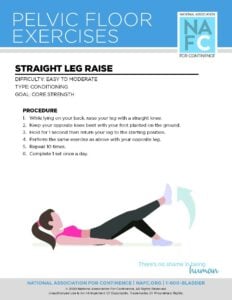Downloadable Exercises For Your Pelvic Floor
JOIN OUR NEWSLETTER
Receive custom tools to help you manage your condition and get the latest in bladder and bowel health from NAFC!
Downloadable Pelvic Floor Exercise Sheets
Keeping your pelvic floor healthy and strong is a daily effort. Just as with normal strength training and exercise, it’s important to regularly work your pelvic floor so it can fully contract, relax and function properly. Regular pelvic floor workouts also help to prevent other problems, such as urinary incontinence.
Click the images below to download these workout sheets and work with your pelvic floor physical therapist to develop a routine that works best for you!
Note: Always check with your doctor or PT prior to beginning any new exercise routine.
Difficulty Level: Easy - All Fitness Levels
Difficulty Level: Moderate
Difficulty Level: Difficult
Difficulty Level: Very Difficult
NOTE: The information shared within NAFC’s Pelvic Floor Health Center is meant to be used as a guide but should not be considered a replacement for medical advice. Not all pelvic floor exercises are for everyone, and we strongly urge you to talk to your doctor before beginning any new workout routine, and, if possible, see a physical therapist trained in pelvic floor health to receive a diagnosis and treatment recommendation.
RELATED ARTICLES

Incontinence & Intimacy: Reconnecting After Bladder Leaks
For many people, sex and intimacy is about far more than physical closeness. It’s about confidence, connection, vulnerability, and feeling comfortable in your own body.
When urinary incontinence enters the picture, those feelings can quietly change.
While often discussed as a physical condition, incontinence can deeply affect emotional well-being and romantic relationships, something many people experience but few talk about openly.

The Financial Impact of Incontinence: Costs You May Not See
Incontinence is often discussed in terms of symptoms and quality of life but for many people, it also brings a steady (and sometimes surprising) financial burden. Beyond the obvious cost of pads, protective underwear, and skin-care products, there can be added expenses from laundry, missed work, caregiving needs, and medical visits. The good news: understanding where the costs come from is the first step toward reducing them—and getting the right treatment can be a cost-saver, not just a health improvement.

Speaking Up About Incontinence
For many people living with bladder leaks, the hardest part isn’t the symptoms themselves.
It’s deciding to talk about them.
Bladder leaks can feel too small to mention, too embarrassing to explain, or not “serious enough” to justify a doctor’s visit. Many people quietly manage symptoms for years—adjusting their routines, limiting activities, and hoping things don’t get worse.
If this sounds familiar, you’re not alone. And you’re not wrong for feeling this way.

Incontinence & Intimacy: Reconnecting After Bladder Leaks
For many people, sex and intimacy is about far more than physical closeness. It’s about confidence, connection, vulnerability, and feeling comfortable in your own body.
When urinary incontinence enters the picture, those feelings can quietly change.
While often discussed as a physical condition, incontinence can deeply affect emotional well-being and romantic relationships, something many people experience but few talk about openly.

















































